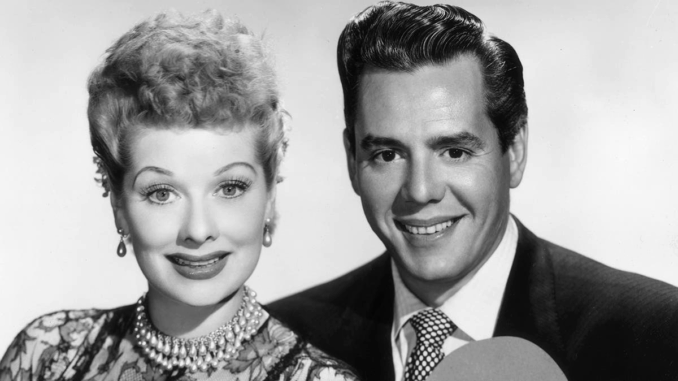
In the golden age of television, a handful of shows and the actors who brought them to life became a part of the American family. For millions, the irascible but lovable Fred Mertz was a fixture in their living rooms, a character made immortal by the brilliant comedic timing of William Frawley. When Frawley passed away in 1966, his death marked not just the end of a life, but the closing of a chapter in TV history. His funeral, a solemn affair attended by Hollywood’s elite, became the setting for a quiet, poignant moment that spoke volumes about the respect and camaraderie that existed behind the scenes.
It was at this graveside service that a now-legendary exchange occurred between two of the era’s biggest names: Desi Arnaz, the co-creator and star of I Love Lucy, and Fred MacMurray, the leading man of My Three Sons. While the moment was private, the story has since become a cherished piece of Hollywood lore, revealing a deep sense of respect and gratitude that transcended professional rivalry.
The Man Behind the Legend
William Frawley’s career was a long and distinguished one, spanning vaudeville, Broadway, and dozens of films before he landed the role that would define his legacy. As Fred Mertz on I Love Lucy, he played the cranky, penny-pinching landlord who, despite his constant bickering with his wife Ethel (played by Vivian Vance), was an indispensable part of Lucy and Ricky Ricardo’s lives. Frawley’s chemistry with Vance was legendary, and their on-screen dynamic became a masterclass in comedic partnership.
But behind the scenes, Frawley’s relationship with the show’s co-creator, Desi Arnaz, was a special one. Arnaz, who had a reputation as both a brilliant businessman and a demanding boss, had a deep affection for Frawley. He saw a kindred spirit in the veteran actor, a man who was as no-nonsense in real life as he was on screen. Arnaz often joked that Frawley was the first person he ever worked with who was “more stubborn” than he was.
When I Love Lucy ended its run, Frawley, ever the working actor, was not ready to retire. He was soon cast as the grandfather and live-in handyman, Bub, on the hit show My Three Sons. He was a perfect fit for the show’s wholesome, family-centric tone, bringing his signature blend of grumpiness and warmth to the role. For the remaining years of his life, Frawley was a television fixture, entertaining audiences in two of the era’s biggest shows.
A Poignant Farewell
William Frawley passed away on March 3, 1966, from a heart attack. The news was met with immense sadness in Hollywood, and his funeral was attended by a who’s who of the television world. Among the mourners were his co-stars from both I Love Lucy and My Three Sons, including Fred MacMurray.
As the ceremony concluded and the mourners began to leave, Fred MacMurray, the patriarch of the My Three Sons family, approached Desi Arnaz. He knew that Arnaz had worked with Frawley for years and wanted to share a word with him. The two men, titans of television, stood together, sharing a quiet moment of grief and respect. It was here that MacMurray, according to accounts from those present, said something to the effect of, “I’m sorry for your loss, Desi.”
It was Arnaz’s response, however, that has been immortalized in the annals of Hollywood history. Arnaz, known for his directness and his emotional honesty, looked at MacMurray and said, “You know, Fred, you took such good care of my Fred. I am forever grateful.”
This simple, heartfelt statement spoke volumes. It was a moment of profound gratitude from one TV patriarch to another. Arnaz wasn’t just expressing condolences; he was thanking MacMurray for providing a safe and creative home for William Frawley after their time together on I Love Lucy had ended. It was a recognition that MacMurray had treated Frawley with the respect and care he deserved, and that he had allowed Frawley to continue doing the work he loved so much.
The Legacy of Respect
The story of this exchange has been shared by those close to both Arnaz and MacMurray, and it stands as a powerful reminder of the deep bonds that can be formed in the entertainment industry. It shows that even in a world of cutthroat competition, there can be genuine respect and admiration.
The sentiment behind Arnaz’s words is a beautiful reflection of his own character. He saw himself as Frawley’s protector and advocate, and he was grateful to MacMurray for continuing that role. It was a powerful and public acknowledgment that William Frawley was not just an actor but a part of a family—a television family that spanned two different shows.
This story also helps to contextualize the relationship between William Frawley and Fred MacMurray. It shows that MacMurray’s care for Frawley was not just a one-time thing but was part of a consistent and respectful working relationship. It’s a testament to the kind of man MacMurray was—a steady, reliable presence both on and off-screen.
The legacy of William Frawley is one of immense talent and undeniable influence. But the story of his funeral, and the simple, powerful words shared between two television legends, adds a new, more personal layer to that legacy. It’s a reminder that behind the laughter and the on-screen antics, there was a world of respect, camaraderie, and genuine affection. In a business built on artifice, the sincerity of that moment at the graveside is as real and enduring as the laughter Frawley brought to millions.